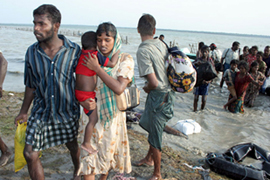Quiet or simply silent diplomacy?
Critics fear UN chief’s low-key approach fails to keep big member states in check.

 |
| Ban says he needs more political support and funds from member states to do a better job [EPA] |
Ban Ki-moon has been secretary-general of the United Nations for exactly two and a half years on Wednesday, July 1.
Ban took over as the world’s leading diplomat on January 1, 2007 from Kofi Annan.
But whereas Annan was seen as ready to speak his mind, Ban is regarded as a much quieter bureaucrat, working behind the scenes to get things done.
It’s thought Ban, a former foreign minister of his native South Korea, would like to serve for a second term at UNHQ in New York.
But many wonder if his brand of low-key diplomacy is right for today’s troubled and divided world.
Asia’s candidate
Ban is only the eighth man ever to be elected UN secretary-general, attending his inauguration at the end of 2006.
He replaced the once popular African born two-term secretary general Kofi Annan, whose reputation towards the end had been tarnished by the Iraq Oil For Food scandal.
It was Asia’s turn for the job and Ban was selected with the full backing of Security Council heavyweights America and China.
| In video | ||
|
|
From the outset he made it clear his approach to the job would be low-key.
“My first priority will be to restore trust,” he said at his inauguration.
Two and a half years on and the secretary-general is trying to build-up confidence in his first 900 plus days in office, aware there are those who think he’s not quite up to the job.
On June 11, he said: “It is just impossible. I need more political support. I need more resources by the member states. Then judge my support on the basis of that.”
As Ban positions himself for a second run at high office, his professor at Harvard University, Joseph Nye, says the secretary-general’s chief selling point is precisely that below the radar approach.
Soft power problem
“The problem with that job is that you have soft power of attracting people,” Nye told me.
“You don’t have much hard power, so you are more secretary than general.”
But many on the UN staff are not convinced Ban’s the man for the top job in these troubled times.
 |
| Critics say Ban took too long to get into Myanmar after Cyclone Nargis [GALLO/GETTY] |
They point to the length of time it took him to get aid into Myanmar after Cyclone Nargis.
They are critical of his decision to visit Myanmar this week when Aung San Su Kyi is on trial.
They express amazement he praised the Israeli government on the day he published only a summary of the UN’s report into the Gaza War.
And they highlight the UN’s lack of clarity regarding civilian deaths at the end of the Sri Lanka’s war with the Tamil Tigers.
There is also a feeling that Ban sides too often with the major powers.
Nye disagrees: “It’s one thing to say you’re the hero of the small countries, but if you can’t get the big powers to behave, to go along with things, then you’re not going to be very effective.”
‘Silent diplomacy’
But critics argue Ban fundamentally misunderstands the role of the secretary general in the new century and has failed to grow into the job.
Thomas Weiss, who teaches UN studies at the City University of New York, says: “There’s a difference between quiet diplomacy and non-existent diplomacy, or silent diplomacy, which is what we have at present.”
 |
| Ban has been criticised for lack of clarity over civilian deaths in Sri Lanka [EPA] |
While Ban’s applauded for his work talking-up the risks of climate change even his supporters recognise he scores low in other vital areas of leadership.
Harvard’s Nye suggests: “He might ask himself whether he’s got the balance quite right on speaking up verses mediating.
“I think he might ask himself if he might do a little bit more on managing the institution.”
There is a sense that Ban lacks the ability to defend the UN and stand up for its staff in the way this man Kofi Annan used to do.
But unless he gets a better offer from his native South Korea it is expected Ban will get his second chance on the 38th floor here at UNHQ – if only because he doesn’t antagonise the powerful permanent five Security Council members.
